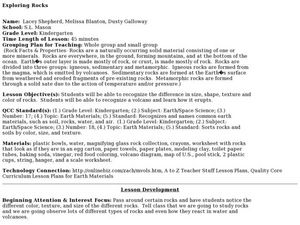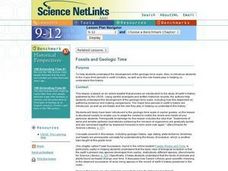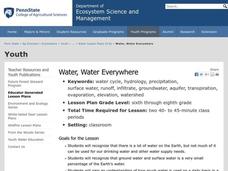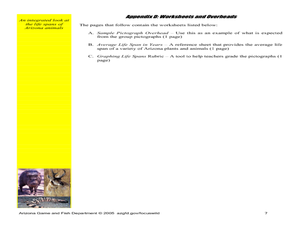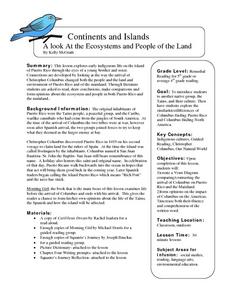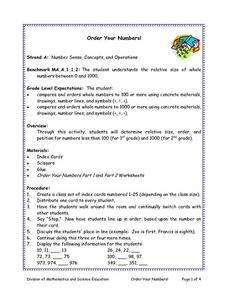Curated OER
How Can We Keep Our Forests Intact and Have Our Chocolate Too?
Fourth graders explore various methods of growing and harvesting rainforest foods in order to sustain its biodiversity. They discuss the various uses for trees from several viewpoints. Students research chocolate demand and land use...
Curated OER
Ecuadorian Rainforest: If the Forests Could Talk
Third graders explore the delicate balance the must be maintained in a rainforest ecosystem. In this ecosystems activity, 3rd graders learn about the importance of "little things" such as bugs or a certain plant in the rainforest. This...
Curated OER
Sorting Nets
Students explore sorting networks. In this computer science instructional activity, students problem solve as they investigate a parallel processing sorting network.
Curated OER
Metric Conversion
Seventh graders convert within the metric system of measurement. In this seventh grade math/science instructional activity, 7th graders view a PowerPoint presentation that introduces metric conversion. Students use the Stair-step...
Curated OER
Super Spreadsheets
Learners develop a spreadsheet containing statistical data. They describe and interpret the data to make conclusions. They review the differences between an unorganized spreadsheet verses an organized one.
Curated OER
The Secret Garden
Students explore plants in science and England as they synthesize data from the book, "The Secret Garden in this twelve lessons unit. Comparisons between the nuturing needs of plants and humans are made.
Curated OER
Exploring Rocks
Students collect and examine rocks. They record information about the rocks they have collected in their notebooks. They compare and contrast different rocks and complete a class chart at the end of the lesson plan.
Curated OER
Light Plants and Dark Plants, Wet Plants and Dry Ones
Young scholars plant sunflower seeds in plastic cups, and once germinated, these are exposed to different conditions of light levels and/or soil moisture contents. Students measure growth of the seedlings every few days using...
Curated OER
Fossils and Geologic Time
Students explore the development of the geologic time scale. They examine the major time periods in earth's history. Students discuss the role fossils play in helping us understand history.
Curated OER
Invasion of the Germs: We Fight Back!
Students fight off germs. In this technology skills lesson, students create claymation videos with accompanying podcasts that educate others about the H1N1 virus and methods to fight germs.
Curated OER
Claire Damarodas
Fifth graders examine how sugars may be listed as an ingredient in various ways. E.g. Many of the words end in -ose (ex. Sucrose, dextrose, maltose)
Curated OER
Water, Water Everywhere
Students recognize that all of the water on earth cannot be used for drinking and that the percentage of ground and surface water is a small percentage. For this water lesson students identify ways to conserve water.
Curated OER
A Natural Habitat: What, How and Why
Students understand what a habitat is. They determine why a habitat is important to our environment no matter where it is located. Students observe and recognize natural habitats in their surroundings.
Curated OER
Charting Animal Life Spans
Second graders research animal life spans and complete related math activities. In this life span lesson, 2nd graders read How Many Candles and discuss life spans. Students arrange animal cards based on their life spans. Students find...
Curated OER
ARTQUARIUM
Learners identify different underwater creatures, explain the importance of recycling in the community, plan preliminary sketches on paper, and construct and sculpt with chosen materials to create creature in paper mache.
Curated OER
Sediment Deposition Lab
Learners set up a stream table, observe erosion, and record data on where various sizes of sediments settle. They draw conclusions as to what kind of sedimentary rock form in what locations.
Curated OER
Who's Who In America? Multicultural Achievers A to Z Past & Present
Students are introduced to important people who have made contributions to society from different cultural groups. As a class, they develop a definition for diversity and work together to make a comparison chart to discover how people...
Curated OER
Design-A-Weed
Students create a "super weed" that prospers in teh harsh conditions on plant Weediv. They comprehend how weed adaptations give the plants an advantage over native plants. Students define the term adaptation. They give three examples...
Curated OER
Ready, Set, Tech
Students oabsrve pictures of a Brachiosaurus and an Apotosaurus. They discuss how features are similar, and different. Students list data in a Venn diagram. They visit book mark websites. Students write three facts on how to saurpods...
Curated OER
Continents And Islands
Learners engage in a literature study in order to address the concept of exploring the culture of Puerto Rico. The instructional activity looks at the culture through the eyes of two children. This helps students to connect to the...
Curated OER
Human Demographics
Pupils explore factors that change human population growth in a biology simulation for seven countries including the United States, China, Egypt, Germany, Italy, India, and Mexico. Factors such as age at which women begin having...
Curated OER
Order Your Numbers
Students examine the order of whole numbers that range from 0 to 1,000. They compare and contrast the quantities of different numbers using the number line, objects, and symbols of comparison. Students also work as a class with cards to...
Curated OER
Comparing or Contrasting Two Books
Students compare two pieces of literature. In this literary comparisons lesson, students read 2 books that they personally select and then compare and contrast the literary elements of each in a comparative essay.
Brain Scape
Learn About Religions
Buddhism, Christianity, Hinduism, Islam, Judaism, Taoism. The major religions of the world are the focus of a resource that uses flashcard decks to engage users in a study of the principles and practices of these belief systems.








